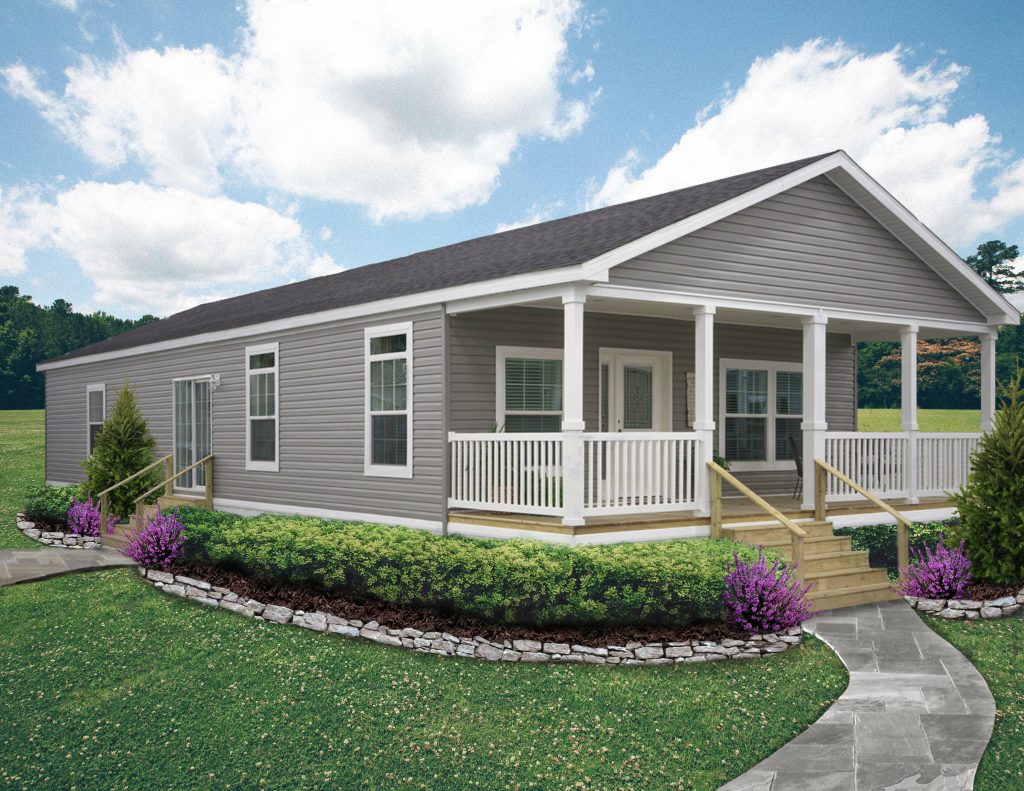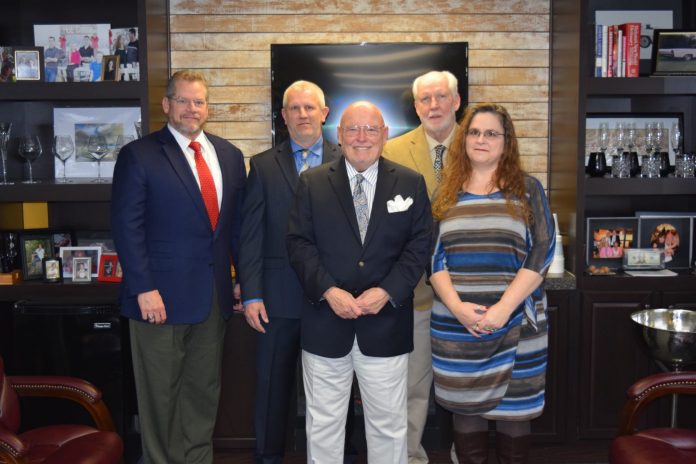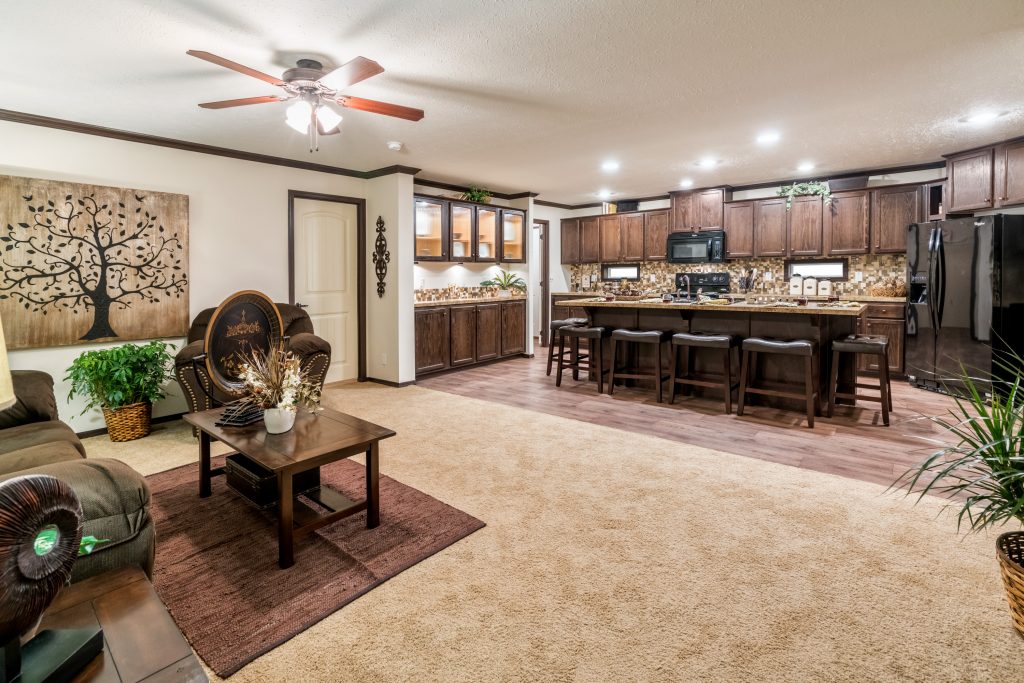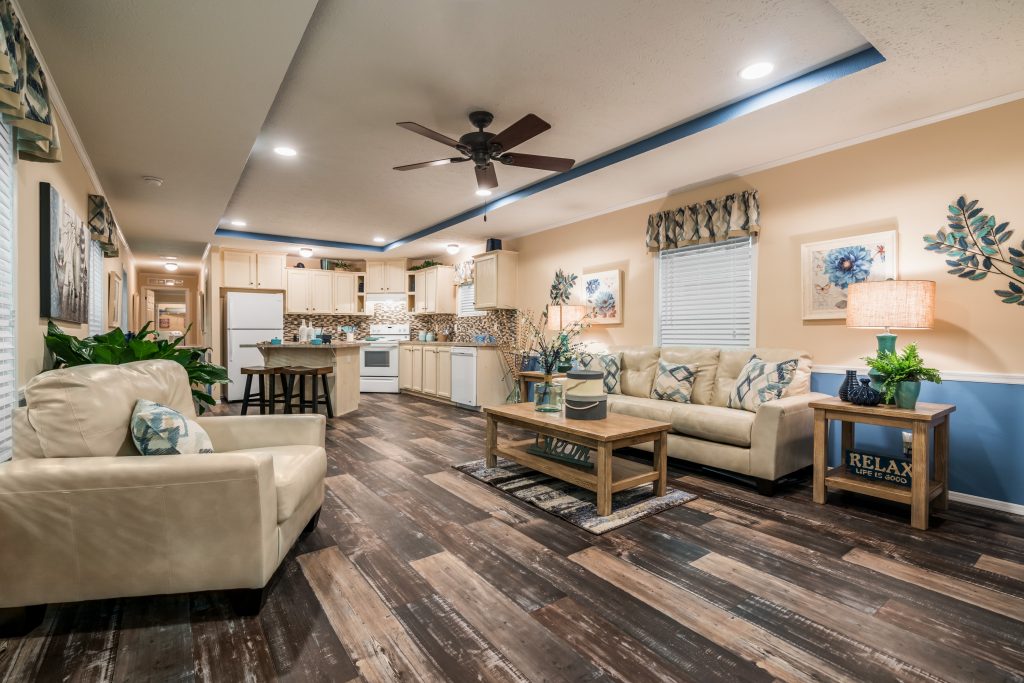Wally Comer’s Adventure Homes Aims to Close Its First Decade on a Strong Note
Adventure Homes is only nine years old, but you’d be forgiven if you felt the award-winning manufacturer has been building homes for as long as you can recall.
The industry’s national trade organization, Manufactured Housing Institute, in each of the last two years has pointed to Adventure Homes as manufacturer of the year for those with two plants or fewer.
And though the single-plant builder based in little Garrett, Ind. had a rather unconventional start, Adventure Homes President Wally Comer and his team have managed to quadruple revenues since the company’s first year.
Adventure Homes has added a 20,000 square-foot finishing plant, the team has grown to more than 200 employees on the production line, and the company has built a steady stream of high-quality, hand-crafted and well-priced homes – to the tune of 1,520 homes in 2017.
“The first 20 years of ups and downs has prepared me for the ride I am on now and it is a great ride,” Comer said.
The First 20 Years
“I came out of college in 1971 and ran into a young guy who was driving a brand-new Corvette. He was my age and had a Corvette not a Volkswagen.
“I said what in the world do you do? And he said he was a controller for a recreational vehicle plant in Riverside,” Comer recalls. “I told him that I couldn’t find anything that I wanted to do, but I was interested in what he was doing. I was working for a pharmaceutical company and hated it. He came to my apartment later and said he got me an interview. The HR guy told me to talk to one more person before he hired me, and that was Jess Maxcy. Jess hired me and has been a mentor for me my entire career.”
Jess is the current state association director in California, but at the time of Comer’s hire was the youngest VP in the Industry.
“He ran the entire recreational vehicle operation at Redman. And, he was arrogant,” Comer said. “He came into my office on the first day and introduced me to the sales manager, and the general manager, and left no doubt who was in charge. Jess has a strong, forceful personality, but Comer was not put off by Maxcy’s demeanor. He embraced it.
Wally Comer called on him for answers to the many questions someone new to the industry might ask.
“Every time I needed advice, I would call him. He is a very knowledgeable guy. I still call him,” Comer said.
Some of those calls, as it turns out, would be long-distance. The kid who grew up in Glendale, Calif., was shipped off to work in Silverton, Ore.
“It was a little bus stop town,” Comer said. “At the Silverton Hotel, you had to go down to the lobby and get the phone to bring it back to your room.”

‘It was just nuts’
In the 1970s the manufactured housing industry was a wild ride always perhaps about to leave the tracks. The industry was rolling out about 550,000 homes each year.
“Fleetwood, Skyline and Redman were the big three,” Comer said. “And there were a whole lot of guys gaining ground on those three including Clayton and Champion.
“If you were talented at all, they were promoting you up because manufacturers had so many plants and were continuing to open more, he said.
Comer was in Oregon about a year when Bob Steins, the sales manager at Redman, mentioned a new sales manager opening to consider.
Turning heads, climbing the ranks
“I said ‘What? I have been a been a salesman here’ and for only a year,” Comer said. “But I got the job and was the sales manager.” It took no time at all for Comer to realize why he got the sales manager’s job.
His first step was to attend a sales training in Texas, where he encountered a couple of trainees from Georgia.
“Some of the salesman and trainees I encountered were not very good,They couldn’t sell anything,” Comer said. “When I asked about it they said they didn’t ever call anyone. They didn’t have to call anyone. Everyone just called them and they signed orders. My income tripled in 1972 as I started influencing other people to attain their goals.
“The industry you see today is nothing like it was. It was ‘Wild Wild West’. People were making so much money they didn’t even know how much they were making,” he said. But Comer was building the foundation of solid sales procedures and discipline that would prepare him and the people around him for what was looming.
Comer went to North Carolina for a job with Coburn Homes. He was there roughly two years when Bob Steins called again. This time he was in Florida and wanted to see if Comer was interested in a general managers’ training program. He saw this as another opportunity to gain experience, so at the age of 27 started to prepare himself for general management.
The work was for Zimmer Homes, out of Cordeal, Ga.
“Georgia was big mobile home country,” Wally Comer said. “It was a trip.”
It was a trip that lasted only four months. Comer said he had begun to doubt the industry, and had ideals about doing something in the world of finance. He left Zimmer and he left manufactured housing for 10 years.
The Hiatus
Comer left the industry but did not very far. He joined AMP, Inc. in Harrisburg, Pa. They were the largest manufacturer of electrical and electronic connectors in the world.
Comer said he spent those years messing around a lot, spending money, and eventually came to terms with the fact he had taken a misstep. He was thinking about his career, about manufactured housing again, and called Jess Maxcy to talk about it.
“I asked him what he thought about me coming back in the manufactured housing industry again? He said ‘Have you learned your lesson? Will you listen to me this time?’” Comer said.
A Return to Manufactured Housing
Lee Posey was president of Redman when Comer started in 1971, but went on his own to start Palm Harbor Homes in Dallas. Maxcy told him Palm Harbor had recently opened a plant in Ohio, and maybe Comer could be in sales.
Comer again kick-started his career in the manufactured housing industry, putting it on himself to develop the people who would help grow the business.
“I was there for a year and did extremely well, had a great year, but it was like the old cowboy industry again, and I questioned myself again,” he said. “It seemed I couldn’t find a lot of good, professional people to rely on.”
It was the mid-1990s. He was on the phone with a friend, a dealer in the industry who urged him to make a change.
Comer went on to talk with Terry Desio at the Skyline drywall plant in Sturgis, Mich., and met a general manager with Skyline named Gary Lambert.
“He was a great GM, and we took off,” Comer said.
A fresh start with some of the same old challenges
But as his roller coast career would have it, Lambert soon exited for Palm Harbor.
Regardless, it was at Skyline where Comer really got started.
The industry was noticing the success that Comer was bringing to Skyline, and Tom Lizzy with Holly Park wanted Comer to move over to run the Ohio territory.
“I loved Lizzy,” Comer said. “He said the territory was doing 500,000 per year, and when I was there our homes weren’t even listed in the top ten in the state.”
This was the first time that Comer could show what he could do on his own. It was a meteoric rise in that market. By building relationships with two of the largest dealers, Ace Elsea and Steve Schwartz, in Ohio he took the territory from 500,000 annually to more than 12 million in only six years. He learned the value of relationships both with customers and co-workers in building business.
He was pondering where the next step would be, with his new-found philosophy on people management versus money management, he decided he was ready to go on his own.
Lifetime Homes
“My partner was Paul Lytle. He had been a controller, and we got a bunch of investors. We ran Lifetime Homes for about three years,” Comer said. “We were experiencing a steady increase in production, but as the turn of the century was upon us so was a downturn in the industry.
“Our investors were not in the industry themselves and were not comfortable with their investment,” he said. “We were forced to sell off assets. This was not an indictment of our business plan as much as the ‘lack of fortitude’ of our investors.”
However, the situation couldn’t break Comer’s confidence in himself as an owner of a manufactured home company.
Fleetwood in Garrett, Ind.
It was 2003, and Comer said he felt as though he was starting again. He worked for a bit as general manager for Ritz-Craft Homes in Jonesville, Mich. Then he went to work with Chuck Wilkinson, someone he had worked with at Palm Harbor who had landed at Fleetwood.
Wally Comer was asked to run the infamous Fleetwood Garrett Indiana plant with the promise that he could move out to take over the Arizona territory after two years. Everyone warned him away from it, but Comer went anyhow. The Garrett facility had seen a half dozen GMs in just as many years. However, Wally Comer felt his presence was needed.
“I got there and we turned it around. We were surrounded with really great people, wonderful staff. I had friends in Ohio, called all the dealers I know and told them to come down, we were going to have a show,” he said. “We got some homes out there in the lot and had people through them.
“Dealers walked into a house and said ‘Wally, can we do white trim?’ I said yes, and they hugged me. They were so glad to have a salesman back in the plant, someone who understood service,” he said.
The attitude of the employees changed.
The attitude of the customers changed. And Comer was seen as the right guy at the right time. However, more dark clouds were on the horizon. In 2009, Fleetwood Enterprises closed doors and left the Garret facility with a great product, a great workforce and a great customer base without ownership.
“It’s the best thing that ever happened to me,” Comer said. “Liberated is a good word for it.”
That Same Little Plant in Garrett
Comer went home, talked with his wife. Many of the workers from the plant showed up and bluntly suggested he buy the place, run the plant himself.
Comer, of course, worried about financing and the level of energy it would require.
But all of those people? Their jobs. Their families?
“My wife Joanna, she is really the one who pushed me to have the courage to do it. She was willing to risk it all. She told me she was certain I could do this,” Comer said.
He sat with a banker and said he wanted to buy the plant. The banker said “I want to be taller.” The pair agreed that resources were less than sufficient for that kind of purchase. But the banker said a pair of investors he knows might have some interest.
“That was nine years ago, Aug. 5, 2009,” Comer said.
Walt Fuller and Jerry Henry put up the money, and Wally Comer showed up on the last Friday of operation for what was Fleetwood Homes Garrett Plant 55. On Monday it would be Adventure Homes Plant 1.
The New Headquarters
Adventure Homes couldn’t even hang a sign out front. There were no formal agreements for pay, or insurance or other benefits. But more than 100 people showed up to build homes. In no time, all of the details would work out. The first year, Adventure Homes sold $12 million in homes.
Last year, the company topped $50 million.
Because Fuller and Henry had confidence in Comer, they gave their full support. And the Adventure plan was simple; keep expenses low, and put all the resources they are able into the homes they build. Today, signs hang in the factory that say “Would You Buy the Home You Built Today?” and “Remember, The Next Inspector is The Customer” as well as “If We Don’t Do It Better – Our Competition Will”.
Comer reminds people that the homes Adventure builds cost a substantial amount of money, but the quality and care that goes into them is free.
They don’t really care about the numbers, not as much as about the house. They build what people want. The company is built on providing a home to be proud of at an affordable price. It’s “Luxury and Comfort for Less”.
“I’m not a mass producer,” Wally Comer said. “I’m sort of a quasi-custom builder, and we’ve been very successful.”
A Tough Time for a New Venture
Adventure’s General Manager Rich Rice said, in a strictly business sense, 2009 was not the best time in the industry to start a manufacturing facility. But the decision to launch Adventure Homes had little to do with strictly business logic, and more to do with the passion of the people here to succeed.
“We knew our people could do it better and continue to create a demand for our homes even up against larger, more financially stable competitors,” Rice said. “We could do it better and for less money.
“This was as pure as it could be in terms of one individual trying to save some jobs,” Rice said. “It was about Wally and his partners, and this town, and their intentions for it. We spent those first three years using what we had learned at Fleetwood, but it really was only an experimental start for us along the way to finding our niche.”
He said the leadership began to learn just how deeply talented the workforce is, and understood Adventure really could offer a custom home in a way no one else has, from the manufacturing line.
It was a brave assertion that Adventure Homes has made good on. It is an adventure that professionals industry wide, as well as homeowners in the Midwest, very much appreciate.
“We go to a show with a home that has all that ‘bling’ in it for a low price, and we started turning the conversation around so that it’s no longer a wonder that we are able to do this type of customization, but why others don’t,” Rice said. “That’s taken us a long way.”
And, Wally Comer’s roller coaster career has reached a height he aims to hold for a while.
“Joanna is the love of my life, and I’m incredibly happy. Both of my business partners are super good guys. They put the funds behind me and it’s just been, it’s been what I’ve always wanted,” Comer said.
“If I had to do it, I would not have changed much as everything that has happened in my career has led right here. Manufactured housing has been good to me and I’ve really love the friendships,” he said. “Only in this industry can you get by this way. You do not need fancy degrees or a boatload of talent, you just have to be willing to do the work. The industry is filled with opportunity.”
“Wally is one of those individuals who absolutely gives back to the people who got him here, and it’s really easy to work for someone like that.” – General Manager Rich Rice
Adventure Homes Senior Staff
- Managing partner/owner – Wally Comer
- General manager – Rich Rice
- Production manager – Keith Carnahan
- Purchasing manager – Jerry Winter
- Controller – Susan Kasinger












